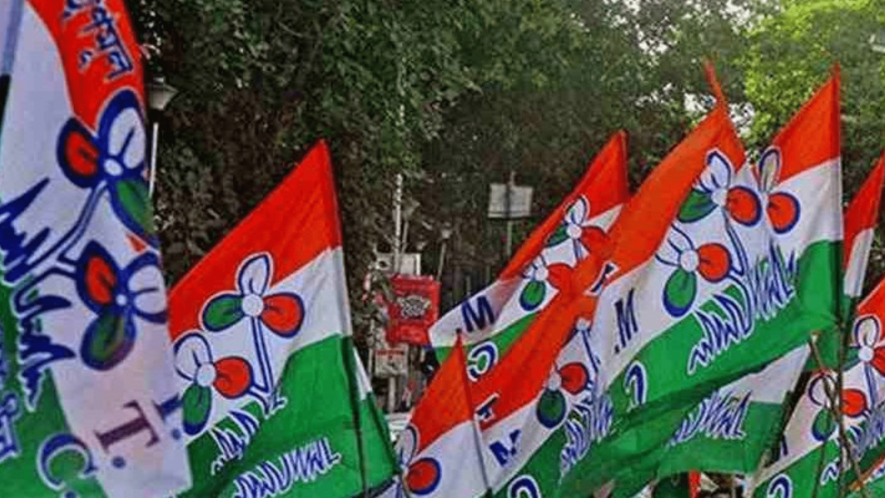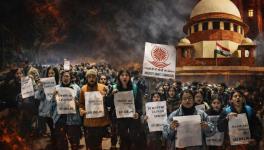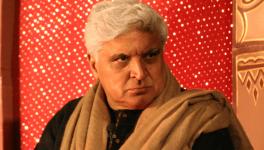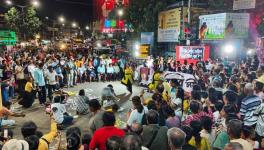Why TMC Fears and Opposition Demands University Polls in Bengal

Representational Image. Image Courtesy: PTI
The careers of countless charismatic mass leaders in West Bengal—from current Chief Minister Mamata Banerjee to former chief minister Buddhadeb Bhattacharya and ex-Left Front chairman Biman Bose—were forged in the crucible of campus politics. But, shockingly, student elections have not been held for six long years in the politically conscious state—and there is no certainty about when they will eventually be held.
The Students' Federation of India (SFI), affiliated to the Communist Part of India (Marxist), is relentlessly demanding elections in colleges and universities; its members recently marched to the legislative assembly to exert pressure on the Trinamool Congress government to announce the dates for campus polls. Under the law, holding elections each year is the responsibility of the Education Department in consultation with the administration, especially the police. But the Mamata Banerjee government is strangely lackadaisical. Although there is unanimity among the four major students organisations—SFI, Chhatra Parishad affiliated to the Congress party's NSUI, Akhil Bhartiya Vidyarthi Parishad (ABVP) owing allegiance to the Bharatiya Janata Party and even the West Bengal Trinamool Chhatra Parishad (TMCP) affiliated to the ruling party—that long delayed student union elections must be held as soon as possible.
The SFI virtually had no competition during Left rule from 1977 to 2011; it controlled 80% of student unions. Its dominance waned with regime change, and the TMCP rapidly took over campuses across the length and breadth of the state. SFI attributes the TMCP’s rise to the misuse of official machinery besides money and muscle power. In January 2017, when state-wide polls were last held in all colleges and universities with recognised unions, the TMCP swept the polls after winning 450 out of 478 student bodies. The SFI could retain barely 10-15 campuses. The Chhatra Parishad and the Democratic Students Organisation (DSO), affiliated with the Socialist Unity Centre of India (SUCI) party, fared even worse—managing only a token presence in a few institutions.
Listing the reasons for the government’s failure to hold state-wide elections for six years, Srijan Bhattacharya and Pratikur Rahman, West Bengal SFI secretary and President, told NewsClick that the Trinamool Congress is fundamentally against students exercising their democratic rights. They accuse the TMCP of illegally occupying offices and posts won in 2017 and misusing union funds in collusion with spineless college authorities. Both argued that the state government has kept delaying elections as campuses have turned into dens of corruption, and the fraudulent and dishonest dealings would get exposed if the TMCP loses control. They cited bribes for admission and cut money for contracts and teachers’ recruitment as examples of double-dealing that have become entrenched as they are very lucrative. Srijan said that factional fights in the TMCP and the parent party over “sharing the booty” would intensify and erupt if elections are announced.
Yet another reason for not holding student union elections, according to the SFI leaders, is that the SFI is bound to emerge as the principal competitor to the TMCP in votes, shattering the Trinamool Congress-BJP binary trumpeted by the ruling party to project the BJP—rather than the CPI(M) and the Congress—as the political opposition in West Bengal. Questioned about their optimism, Srijan and Pratikur said that SFI membership has now risen to 8,39,000. They added that from a peak of 14,00,000-15,00,000 during the Left rule, SFI membership had fallen to around 7,00,000 after 2011 and has gradually regained some lost ground.
Unlike other West Bengal student union leaders based in Kolkata, Sangeet Bhattacharya, the ABVP’s state secretary, operates from Purulia, 250 km from the state capital. His choice of headquarters is clearly dictated by the BJP’s strength in Purulia district where it won all the three Lok Sabha seats and six out of nine assembly seats in the 2019 and 2021 elections. Sangeet told NewsClick that the Trinamool Congress attaches no importance to campus elections because Abhishek Banerjee, the Chief Minister’s heir apparent and general secretary of the ruling party, didn’t cut his teeth in student politics. Moreover, he said that the Trinamool Congress fears a revolt by the student community if it is allowed to vote and, therefore, the party resorting to illegal means to keep a lid on the volatile situation by disallowing students their franchise.
Sangeet said that the ABVP’s current strength is 82,000 members, and a new drive to enrol new members will kick off on 9 July, ABVP’s Foundation Day. He added that the police had to use a water canon against ABVP workers demonstrating against the teachers’ recruitment scam outside Bikash Bhavan in May 2022. Sangeet insisted that “among all students organisations, only the ABVP enjoys the distinction of water canon being deployed against it, underlining its members’ grit and determination”. He clarified that although he is based in Purulia, ABVP has joint secretaries in Kolkata, Howrah, Bolpur and Murshidabad. According to him, ABVP was at the receiving end of the TMCP’s terror tactics in 2017—much like the BJP’s fate in the 2018 panchayat elections—but would perform exceedingly well in student union elections.
Sourav Prosad, the Chhatra Parishad state president, said that TMCP is very unpopular despite capturing the student unions in virtually all educational institutions, as it is impossible to gain admission into any college without paying a bribe—and even online admissions have made no difference. According to him, campuses have become a regular source of income for the ruling party. The extent of corruption in the Education Department, said Prosad, is evident not only from Education Minister Partha Chatterjee getting jailed in the teacher recruitment scam but from the arrest and imprisonment of Members of Legislative Assembly Manik Bhattacharya and Jibon Krishna Saha, besides senior Education Department officials like Shanti Prasad Sinha and the Vice Chancellor of the University of North Bengal, Subires Bhattacharya being behind bars.
Prosad claimed that quite a few TMCP leaders are in disgraced Education Minister Partha Chatterjee’s inner circle and will be eventually picked up by the Enforcement Directorate and Central Bureau of Investigation when they dig deeper. He said that TMCP’s day of reckoning is not far, although it appears invincible today—“we are not even allowed to put up posters and hoardings to mark our Foundation Day, which is on August 28—while the TMCP gets away with murder and mayhem”.
Today, the blame for not holding campus polls is being laid at the Chief Minister’s door. Ironically, she entered electoral politics through a student union. She was only 17 when she established a student union in South Kolkata’s Jogomaya Devi College and defeated the DSO in 1972. But strangely, before becoming the chief minister in 2011, she promised to depoliticise student unions, much like her vow to stop bandhs and hartals associated with the Left. In the first two years of Trinamool rule, violence escalated as the TMCP and the SFI locked horns resulting in as many as 27 casualties across campuses. In 2012, police sub-inspector Tapas Chowdhury was shot dead in a clash outside Harimohan Ghose College in Garden Reach during union elections. And in 2013, the SFI’s Sudipto Gupta, barely 22, lost his life in an agitation against the government’s failure to hold campus polls on schedule.
In 2013 itself, the Chief Minister set up a seven-member committee chaired by then Calcutta University Vice Chancellor, Suranjan Das, to frame rules and regulations for the conduct of student union elections in West Bengal based on the JM Lyngdoh committee report of 2006 that advocated banishing political parties from educational campuses. The committee soon realised that it was impossible to have apolitical students’ unions alongside politically-controlled teachers’ unions. And the dichotomy was well articulated by Sugato Marjit, then chairman of West Bengal Higher Education Council.
In mid-2017—taking a leaf straight out of the St. Xavier’s College book—a government order issued out of the blue replaced “student unions” with “student councils” to ban politics from the campus. St. Xavier’s College and institutions like Lady Brabourne College, Loreto College, IIT Kharagpur and Indian Institute of Engineering Science and Technology, Shibpur, have never allowed politics on their turf. Although the Chief Minister endorsed the depoliticised “St. Xavier’s model” in a television interview, the order was ultimately withdrawn without explanation. Notably, Banerjee has criticised the students of Jadavpur University and Presidency University for “politicising” and “disrupting” even “solemn” occasions like convocations and praised Calcutta University students as “respectful” and “homely” during visits by VIPs like the Governor or Chief Minister.
Trinankur Bhattacharya, TMCP president since 2018, told NewsClick that he is “100 per cent” in favour of holding student union elections at the earliest and claimed he has personally urged the Chief Minister and the Education Minister, Bratya Basu, to fast-track them. He said that although polling did take place in four stand-alone universities—Jadavpur, Presidency, Rabindra Bharati and Diamond Harbour—in 2019, it was impossible to hold state-wide elections because of the advent of the COVID-19 pandemic. “Covid is over, but academic sessions are yet to normalise, and academic schedules are yet to stabilise. And now that panchayat elections will be over next month, I am sure the students’ body elections will be held in December or January.”
A rising Trinamool Congress leader, Trinankur denied that the TMCP is the “biggest beneficiary of the moratorium on student union elections”. He said: “We won the 2017 elections fair and square. We will also win the upcoming elections hands down. The leaders of other student unions do not even know the names of more than 15 or 20 colleges in West Bengal and yet call themselves chhatra neta [student leader]. The TMCP will win 98% of unions uncontested because the Opposition is organisationally so weak it will not be able to muster enough candidates. Their membership is so poor that they cannot even marshal the required number of candidates to contest against us. Just watch, we will get a walkover.”
But the competition is confident of springing a nasty surprise. And its optimism stems from the growing disillusionment and anger among the college and university-going youth against the ruling dispensation because of corruption scandals—especially the open sale of government jobs even as unemployment is soaring.
The author is an independent journalist. The views are personal.
Get the latest reports & analysis with people's perspective on Protests, movements & deep analytical videos, discussions of the current affairs in your Telegram app. Subscribe to NewsClick's Telegram channel & get Real-Time updates on stories, as they get published on our website.























